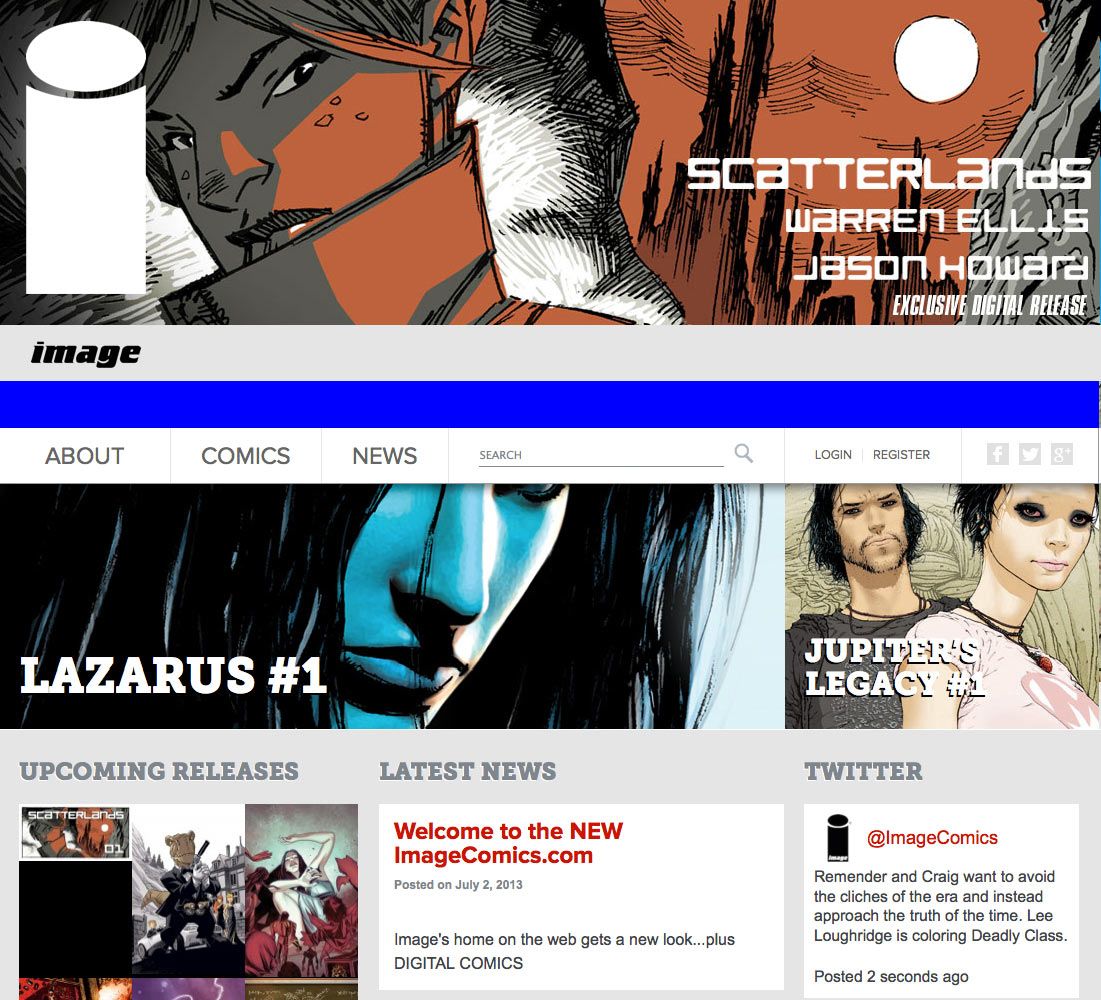Image Comics, holding a media event on Tuesday reminiscent of Steve Jobs-era Apple, announced it will sell DRM-free digital comics through its newly redesigned website. And like clockwork, there it is, beginning with a compilation of the first 50 installments of the webcomic Scatterlands by Warren Ellis and Jason Howard for 99 cents. Also available for the launch are Image hits like Lazarus #1 by Greg Rucka and Michael Lark, and Jupiter's Legacy #1 by Mark Millar and Frank Quitely, both priced at $2.99 to match their print editions. Digital comics can be purchased as PDFs, EPUBs, CBRs or CBZs.
This isn't the first time DRM-free digital comics have been made available, of course. Earlier this year, Brian K. Vaughan and Marcos Martin set up Panel Syndicate to sell their comic The Private Eye in a successful name-your-price model (readers can choose the format). Since 2011, Artist Alley Comics has been putting out a small line featuring creator-owned work by Tim Sale, Craig Rousseau, Richard Case and others as PDF files, generally priced at no more than $1.99. And as early as 2006, the beleaguered Wowio.com began selling downloadable PDFs of comic books and graphic novels. There have also been others here and there.
Headlines touting this as the first time you can get DRM-free digital comics might not be entirely true, but that doesn't take away from it being a big deal. Image is certainly the largest publisher to make this move, and combined with the rest of its digital comics strategy, this instantly positions the company as an industry leader in the digital arena.
So what's the big deal? DRM, or digital-rights management, has been around for some time, and was devised by copyright holders to limit copying and sharing because media should make a certain amount of money per unit sold. Online sharing, or "piracy" as it became known so as to demonize the act, threatened that paradigm. Never mind that bootleg copies, mix tapes and Xerox machines had already done the same thing for years. The difference is that copyright holders could, with an Internet search, see all of the illegal copies sitting right in front them. The instant assumption was that every copy shared equaled a lost sale, and all they could picture was a sea of money floating away. The only people that really knew this assumption was false were the people doing the unauthorized sharing -- and if you already think someone is a criminal, you're probably not going to listen to her explain how she's not a criminal.
While piracy is still illegal, it's become clear that trying to stop it is a fool's errand. Fortunately, copyright holders are finally seeing proof that there are common-sense solutions. Given the option, people will buy the physical version if they like what's been pirated. And people will buy legal digital versions. There will always be the diehards who just want to take and nothing more, and those will probably be easier to track down once everyone else heads for the legitimate alternatives.
The trick, however, is that those legal digital versions have to be at least as convenient as the pirated versions, preferably more so. The price has to be right, and the technical format has to be right. The two major resistance points for digital comics has been price and DRM. Image has just struck the biggest blow to the latter resistance. Even iTunes and its record company clients figured out that DRM was a greater hindrance than it was worth; in 2009, iTunes dropped DRM from its MP3 downloads. There are still some limitations on the music downloaded from Apple's music store (how many computers are authorized to play what you bought), but it's improved considerably. Those limitations are frequently cited for why people prefer buying MP3s from Amazon, which was the first major online music store to offer DRM-free music.
Like iTunes, comiXology had to start with a more stringent system because it was the one that had to first convince publishers it was OK to even sell digital comics to begin with. Before comiXology, many publishers were convinced that selling digital comics would kill print, kill comic book stores and gift pirates with higher-quality copies of their titles. It turns out the opposite is true: Print sales are up, and comic stores have proved to be stronger and more resilient than the industry sometimes thinks. Sure, it's pretty easy to take a screen capture of digital comics, and that's often what ends up landing on pirate sites, but enough of those pirates end up buying a print version if they like what they see, so it ends up being good marketing. That screen-capture trick also drives the point home of how silly it is that comiXology and other digital distributors use the "lease to read" format, which, as we've seen, has its limitations. With Image busting the doors down, it'll soon become apparent that going DRM-free doesn't actually harm anyone, and then comiXology and its publishing partners will have the opportunity to follow suit.
Then can we work on breaking that silly pricing parity with print?

